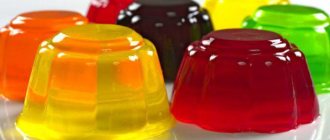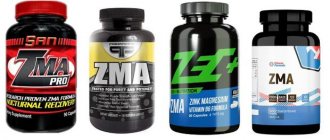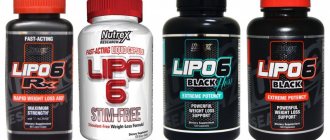Main types of sports nutrition
- Protein. The most common option. It is obtained by synthesizing soy products, eggs and whey. The main task of protein is to replenish the protein supply in the body. It is used to gain muscle mass, as well as in some weight loss methods, when you only need to lose fat while maintaining “quality” weight.
- BCAA. This is a complex of three vital amino acids. Allows muscles to grow faster, as it is instantly absorbed by the body.
- Creatine. The second name is “meat amino acid”. Easily absorbed by muscles, absorbs water. Mainly used for quick weight gain.
- L-carnitine. An amino acid that has become the best friend of those who lose weight. It is useless to take it without training: the weight will not go away. But coupled with going to the gym, L-carnitine can give quick and noticeable results.
- Gainer. This product is used when gaining weight. It will help you quickly reach the desired number of calories per day.
Which sports nutrition to take depends on your goals in the gym. But how to take sports nutrition depends on the supplement itself.
Scientific research
It is always wise to choose sports nutrition, determine your basic diet and training program based on scientific evidence. But given the recent increase in the number and popularity of sports nutrition research, caution should be exercised. The human factor has not been canceled. Sampling errors, funding, miscalculations by scientists, non-compliance by participants with the rules of the study and many other circumstances can significantly affect the results obtained.
Most sports supplements have a good evidence base. But sometimes companies choose one study that shows an ingredient in a favorable light, while 10 other studies show no effect at all. In addition, research work is very expensive. This includes the use of individual pieces of equipment costing hundreds of thousands of dollars, wages for participants costing several thousand dollars, and many other costs. Thus, the research can cost a decent amount. But someone pays for it.
While this money may come from university or government grant funds, research into sports supplements is often funded by private companies.
Usually everything is done objectively and honestly, but you have to consider the fact that manufacturers are unlikely to be happy if they spent $100,000 on studies that show their products don't work.
This does not mean that research is a waste of time or that scientists are frauds. In most cases, choosing a product that has been backed by multiple studies will be a wise decision. But this choice should not be based only on beautiful graphics and advertising information on the label. Do some research: Find out whether the ingredient or supplement has actually been studied by scientists, and check whether the results are supported by other studies.
https://youtu.be/Svx5LJK6cAc
Protein
There are several types of protein supplements:
- Whey. Made from whey. It is considered the most effective and inexpensive protein option. Universal in use.
- Casein. On average, it is absorbed in 6 hours. The cost is higher than the previous type.
- Hydrolysates. A more expensive and effective version of whey protein. If you take this sports nutrition correctly, the results will not take long to arrive.
- Isolate. Of all the types of protein, it contains the most protein. Ideal as a supplement for athletes on a low-carb diet.
- Soy. Protein obtained from soy products. Ideal option for vegetarians. Contains vitamins.
- Egg. Provides the fastest possible gain of muscle mass due to an impressive amount of protein.
The frequency of taking protein supplements is entirely individual, but at least once a day. A protein shake can be used to replace or supplement a meal. You need to consume sports nutrition not only on training days, but on weekends. Because muscle growth does not occur during training in the gym, but during the recovery period.
The amount of protein depends on the intensity of the workout and muscle mass. The higher both are, the more protein is required. On average, it is recommended to consume 5 to 20 grams of protein after a workout.
How to drink sports nutrition is a matter of taste. You can dissolve the protein in water, milk or juice. Less preferred juice on this list. Sugar, which is included in almost all purchased juices and nectars, kills half of the beneficial properties of protein. Milk tastes perfectly with any type of protein supplement. But it can make digestion difficult. The best option is water. It should be chosen at room temperature, purified, non-carbonated.
Protein Tips
- Any type of protein supplement is best taken after a workout. This will ensure easier and faster recovery of muscle tissue.
- Casein is consumed either before bed or in the morning on an empty stomach. This technique allows you to reduce protein loss during the night's rest.
- It is not recommended to drink egg white at night. This can cause heaviness in the stomach and disrupt sleep. Drink it immediately after training.
- Soy and whey protein are recommended to be consumed during the day, but not late in the evening.
- Hydrolysates are effective at any time of the day. But they will bring the greatest benefit immediately after the gym.
We recommend: Maxler 100% Golden Whey Protein
Amino acids
Amino acids are the elements that make up proteins. Muscles are 35% composed of three amino acids:
- leucine
- isoleucine
- valine
This is why amino acids or BCAA (a complex of the 3 most important amino acids) are often used in addition to protein, since they complement each other rather than replace each other. Most often, amino acids are drunk in the morning, before bed or during training, since catabolic processes are at their strongest at this time, and amino acids prevent these processes.
Experience
Like all other sports supplements, amino acids come in flavor and pure form. Professionals recommend drinking pure amino acids, but this is just wild crap. Seriously, I find it much easier to force myself to eat a bunch of chicken breasts every day than to drink that disgusting powder. Therefore, I advise you to still take amino acids with taste, so you will at least feel pleasure from the very process of taking them.
Personally, I did not feel any changes, either in the growth of muscle mass or in my own sensations. It’s hard to say that they didn’t work; perhaps without them everything would have been even worse. But if you choose between them and protein, I would leave protein, since its effect is more pronounced than that of amino acids.
BCAA
You need to take BCAA sports nutrition depending on the form of release. Capsules are taken in the morning on an empty stomach, before and after visiting the gym. If you have the powder version of BCAA, then you need to dissolve it in water in the proportions indicated on the package, and then drink it during training and late in the evening. This technique will allow the muscles to recover faster.
Athletes consider BCAAs one of the most essential supplements. The fact is that amino acids in the required amount are difficult to obtain from food. A complex supplement will charge you with all the necessary substances.
We recommend: Maxler BCAA Powder
Who is sports nutrition intended for?
1. First of all - for those athletes who engage in cyclic sports: runners, triathletes, cyclists, multi-racers - their level of load and length of distances simply do not allow them to use anything else.
During long distances, such as marathons or long trails, runners have no way to carry the necessary food with them to compensate for energy costs.
2. Sports nutrition is used by climbers and tourists during difficult, long routes, when every extra gram of equipment is critical, when weather conditions or terrain do not allow preparing normal food.
3. During a pandemic, sports nutrition is also used by doctors in hospitals, because they are overloaded with work, they do not have time to eat normally, and sports nutrition packages are made in such a way that they can easily be sanitized and disinfected.
Creatine
This amino acid is very popular among athletes who are fond of strength sports. The first course of creatine serves as an “energy booster” for the body, allowing you to increase strength indicators by 10-15 percent in a short period of time. This happens due to energy and gained kilograms. But the main thing is to understand how to take this sports nutrition correctly. Incorrect use can cause harm.
How to take creatine
- If this is your first time drinking creatine, the dosage should be small. For the first 7 days, do not exceed 5 grams of creatine on weekends and 10 grams on training days (5 in the morning and 5 after the gym). Monitor your body's reaction. If your health has not worsened, you can continue taking it.
- From the second to the fourth week, you can double your creatine intake.
- After a month of taking the supplement, you should take a break for at least 14 days. Don’t be afraid that the muscle gain will “go away” during the break. Along with your muscles, your strength indicators also increase, which means that even after you finish taking the drug, the muscles will remain with you.
We recommend: creatine monohydrate Maxler Creatine Bag
Should you drink protein and amino acids together and how to do it?
Novice athletes mistakenly believe that amino acid complexes and protein shakes are interchangeable supplements, so there is no point in taking both at the same time. However, these supplements have different effects on the body, and if you want to achieve the desired results, then they can and should be taken together.
Protein is a building material for the body, increases nitrogen balance, which leads to improved metabolism.
Amino acids are needed by the body for rapid regeneration. They are absorbed and enter the bloodstream much faster than protein, giving a surge of energy and strength. With the help of BCAA and other complexes, you can quickly restore damaged muscles, increase the body's endurance and strengthen the immune system in general.
Classic regimen:
- protein - you can drink it at any time of the day - in the morning, between meals, after training, before bed;
- amino acids - bcaa, glutamine and arginine - before, during and after training.
If your goal is not only to build muscle, but also to get rid of excess fat, then it is recommended to combine protein and carnitine intake. In this case, protein should be taken as usual, and carnitine only before training.
L-carnitine
L-carnitine supplement is available in several forms:
- syrup;
- pills;
- powder.
Its main property is the acceleration of metabolism, due to which weight loss occurs during training. The correct intake of sports nutrition for weight loss is immediately before going to the gym. Can be taken during sports.
We recommend: Maxler L-carnitine Comfortable Shape 3000
What is sports nutrition?
Sports nutrition is a complex of supplements that is used by people actively involved in sports to replenish expended energy and increase productivity during training or during competitions. Most often, such supplements are available in the form of gels, bars, tablets, or in the form of powder mixtures that need to be diluted with water. Natural products are used as raw materials for their production: milk, eggs, meat, soy or cereals. All raw materials for the preparation of sports nutrition undergo special processing and purification, and at the end of production a concentration process occurs, which allows reducing the weight of the products while maintaining the required amount of nutrients in them. Thus, sports fans receive nutritional complexes with a very low weight, purified from ballast products, which are convenient to use when you are limited in the weight of your load and time for food.
As examples, we will consider sports nutrition from the manufacturer SiS (Science in Sports) - this is professional sports nutrition from the UK for endurance sports, the level of Olympic and national teams, one of the most popular in Russia. SiS nutrition is available at Kant in a wide range according to purpose, tastes and volumes.
Gainer
This sports supplement is a mixture of proteins and carbohydrates. Available in ratios from 10/90 to 50/50, where the first value is proteins, and the second is carbohydrates. Gainers are used to achieve a calorie surplus during periods of increased activity or to gain muscle.
Recommendations for use:
- If you drink a gainer after an intense workout, you can “teach” the body to properly use carbohydrates.
- In the morning and before playing sports, drink a gainer to gain energy and increase endurance. After training - for accelerated mass growth.
- Taking a gainer before bed is not recommended.
We recommend: Maxler Special Mass Gainer
How and why to take protein and gainer together
Many beginners wonder whether it is possible to take protein and gainer together and how to combine them. Before answering the question, you should understand how these supplements differ.
Protein shakes consist primarily of protein and a small portion of carbohydrates. By drinking such a supplement, an athlete can quickly compensate for the lack of amino acids in the muscles and speed up their regeneration. Drinking protein drinks helps increase muscle mass and get rid of excess fat.
Gainer is a complex supplement. It contains proteins, fats, slow or fast carbohydrates (depending on the gainer) and has a fairly high calorie content. Experienced athletes note that taking these two sports supplements together gives good results in the process of building muscle mass. This is especially true for people with a thin body type - ectomorphs, who find it difficult to gain weight and provide the necessary calorie surplus from their regular diet. People who are prone to obesity should limit the amount of it in their diet - due to the high calorie content, it is easy to gain extra pounds with a gainer.
For simultaneous intake of protein and gainer, there is a classic scheme:
- gainer - in the morning and after training;
- protein in between meals and before training (1-2 hours before).











